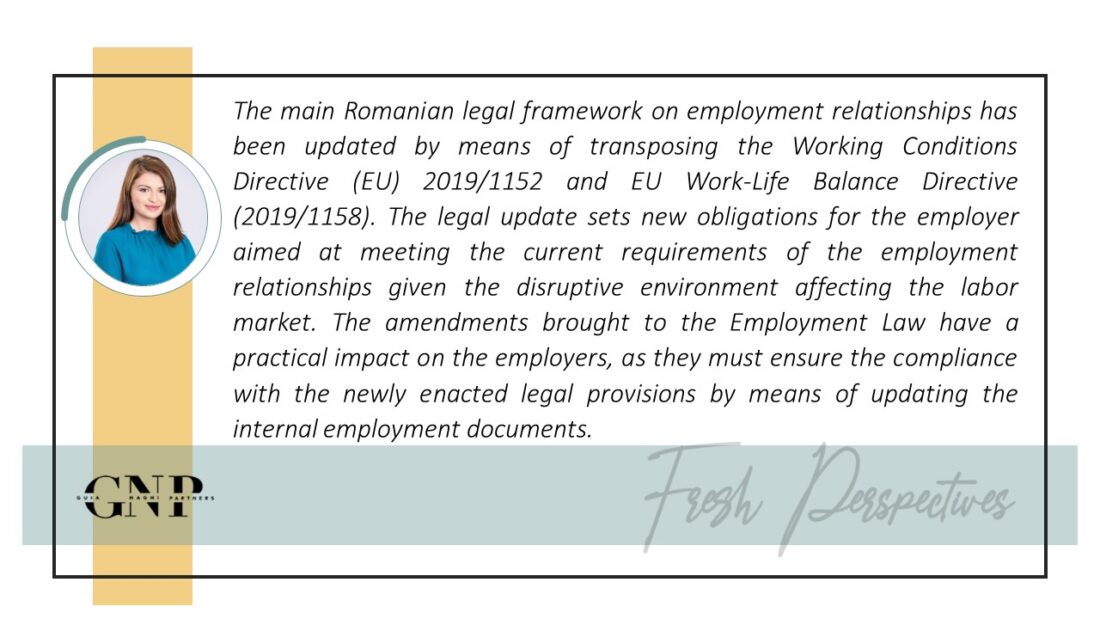Violeta Geru – New requirements for the employers following the transposition of the Working Conditions Directive (EU) 2019/1152 and EU Work-Life Balance Directive 2019/1158
Subject matter of the newly enacted law
Law no. 283/2022 for amending and supplementing the Employment Law no. 53/2003 („Employment Law”) as well as the Emergency Government Ordinance no. 57/2019 on the Administrative Code was recently published in the Official Gazette (hereafter referred to as the ”Law 283/2022”), being effective as of 22 October 2022. The newly enacted legal provisions bring several major amendments to the employment framework, being aimed at transposing Directive (EU) 2019/1152 of the European Parliament and of the Council of 20 June 2019 on transparent and predictable working conditions in the European Union (”Working Conditions Directive”) as well as Directive (EU) 2019/1158 of the European Parliament and of the Council of 20 June 2019 on work-life balance for parents and carers and repealing Council Directive 2010/18/EU (”EU Work-Life Balance Directive”).
New obligations for the employer. Amending the current employment agreement framework and internal regulation of the company
One of the main amendments brought to the Employment Law supplements and changes the mandatory elements part of the obligation to inform the employee prior to the conclusion of the employment agreement (amendment of the elements already comprised in article 17 of the Employment Law), as follows:
- The place of work, or in the absence of a fixed place of work, the possibility of the employee to work at various places of work, as well as information related to the manner of reimbursement of travel expenses between the places of work;
- The salary, including the initial basic amount, any other component elements (e.g. bonuses, additional allowances, etc.), indicated separately, and the method of payment of the remuneration to which the worker is entitled (cash or bank transfer);
- The conditions for conducting and compensating the overtime, as well as the manner of organizing the work in shifts change, as the case may be;
- The duration and the conditions for the probationary period, if any;
- The conditions related to the training entitlement provided by the employer;
- The payment by the employer of private medical insurance, additional contributions to the employee’s voluntary pension or occupational pension, in accordance with the law, and the granting, on the employer’s initiative, of any other rights, where these constitute cash benefits granted or paid by the employer to the employee as a result of the employee’s professional activity, as the case may be.
In 30 days since the publication of Law 283/2022, based on the proposal of the Labor Inspectorate, a new standard framework for the employment agreement shall be approved by way of order issued by the Minister of Labor and Social Affairs.
Failure of the employer to duly inform its employees on the conditions of the employment agreement as stated above might trigger the possibility for the employee to lodge a complaint to the Labor Inspectorate or to request the courts of law the recovery of the damage suffered in connection thereof.
Another change is related to the addition of two new categories which must be specifically provided for in the internal regulation of a company, as follows:
- New rules related to the notice periods;
- New rules related to the general policy for trainings, if applicable.
The employer must ensure that the internal regulation is made available to the employee in the first day of work and must be able to provide proof in this regard (the internal regulation can be made available either on paper or electronically, as long as the document is accessible to the employee and can be saved or printed).
Therefore, following the amendments brought to the Employment Law, the employers are obliged to inform their employees in connection to the new elements mandatory for the employment agreement, to set a new standard framework agreement and to update the internal regulation of the company in view of complying with the new obligations.
New rights for the employees following the transposition of the EU Work-Life Balance Directive
Apart from the conditions related to the standard documents setting the employment relationship, the employer is also obliged to:
- Ensure the award of carers leave, meaning time off work for employees to provide personal care or support to a relative, or to a person who lives in the same household as the worker, and who is in need of significant care or support for a serious medical reason. The carers leave has a duration established by the law to 5 working days per calendar year (the minimum provided by the EU Work-Life Balance Directive) and the duration is not included in the annual leave. The conditions for carers leave, as well as the serios medical conditions based on which the leave is awarded shall be regulated by joint order of the Ministry of Labor and Social Affairs and the Ministry of Health.
Failure to award the carers leave is subjected to a fine between RON 4,000 and RON 8,000.
- Ensure the award of time off from work on grounds of force majeure – each worker has the right to time off from work on grounds of force majeure for urgent family reasons in the case of illness or accident making the immediate attendance of the worker indispensable, conditional upon (i) the obligation of the employee to duly inform the employer; and (ii) the obligation to recover the duration of the time off subsequently.
The EU Work-Life Balance Directive gives member states the possibility to set time limits for time off from work on grounds of force majeure, and according to the newly enacted provisions the Romanian State regulated a threshold of 10 working days per calendar year. The employer and the employee shall agree upon the conditions of recovery of the time off thus granted.
In line with similar situations, the dismissals are not allowed during the above periods of time off. Moreover, should the employee consider that the dismissal was triggered by the exercise of previously mentioned rights, a written request can be made to the employer to state, in writing, the additional reasonings for dismissal.
Other relevant provisions regard the paternal leave, the meaning of working schedule, work pattern, reference hours and days.
The update of the Employment Law is a well expected addition by the employees, in line with previous legal updates regulating the framework of work relationships given the current disruptive environment.





No Comments